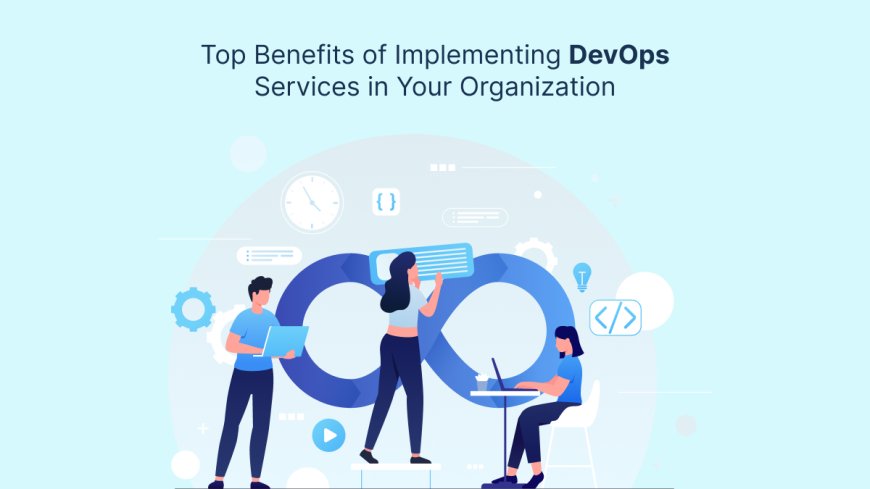Top Benefits of Implementing DevOps Services in Your Organization
Discover the top benefits of implementing DevOps services in your organization to boost collaboration, speed up delivery, and ensure higher software quality.

In today's competitive digital world, businesses need to deliver software faster, with fewer bugs, and with consistent quality. This is where DevOps comes in. DevOps is not just a buzzword; it’s a practical, efficient approach that merges software development (Dev) and IT operations (Ops) to improve collaboration, automate workflows, and enhance delivery speed.
Implementing DevOps services in an organization can completely transform the way software is built, tested, and released. From small startups to big enterprises, everyone is now seeing the value of DevOps in their tech journey. Let’s break it down in simple terms and understand how your business can benefit from it.
What Is DevOps and Why Does It Matter?
DevOps is a combination of development and operations practices aimed at shortening the software development lifecycle while delivering high-quality software continuously. The main idea is to get development and IT operations teams working closely together rather than working in silos. It involves automation, monitoring, collaboration, and continuous improvement.
When companies apply DevOps services, they can build products faster, fix issues more quickly, and reduce downtime. That’s why businesses in all sectors are increasingly turning to DevOps as a game-changer.
Faster Software Delivery
Quicker Releases with Continuous Integration/Delivery
One of the biggest advantages of DevOps is the speed at which software can be released. With practices like Continuous Integration (CI) and Continuous Delivery (CD), developers can merge code frequently and release it automatically. This helps teams push out new features, updates, and bug fixes much faster than traditional methods.
Staying Ahead of Competitors
In many industries, the ability to launch new features ahead of the competition gives companies a huge edge. DevOps allows for rapid innovation without sacrificing quality, which is crucial for businesses that want to stay relevant in the market.
Improved Collaboration and Communication
Breaking Down Team Silos
DevOps brings development, testing, and operations teams together. This means everyone is on the same page, working toward the same goals. When teams collaborate better, they can solve problems faster and avoid miscommunication, which often delays projects.
Better Transparency Across Departments
By encouraging open communication and shared responsibilities, DevOps creates transparency. Everyone involved has clear visibility into the development pipeline, making it easier to manage tasks, track progress, and plan ahead.
Enhanced Quality and Performance
Early Bug Detection
With DevOps, automated testing is a core part of the process. This means bugs are caught early before they grow into serious issues. Developers can address these problems right away, reducing the risk of critical failures in the final product.
Stable Operating Environment
Automation and continuous monitoring lead to a more stable and reliable IT environment. This means fewer crashes, minimal downtime, and better overall performance, which results in a smooth user experience for customers.
Increased Efficiency Through Automation
Repetitive Tasks Handled Automatically
DevOps automates repetitive and time-consuming tasks such as testing, deployment, and configuration. This not only saves time but also reduces the chance of human errors. Teams can focus on higher-value work instead of spending hours on manual tasks.
Faster Troubleshooting and Recovery
If something goes wrong, DevOps practices help identify the problem quickly. Thanks to automated monitoring and logging, teams can pinpoint the issue in real time and fix it fast, which helps in recovering from failures without delay.
Scalability and Flexibility
Adapting to Changing Demands
Businesses often need to scale their applications based on user demand. DevOps enables scalable infrastructure, allowing companies to handle increased traffic or changing user needs without breaking a sweat.
Smooth Deployment Across Environments
DevOps supports seamless deployment in different environments such as development, staging, and production. This ensures that apps behave the same way everywhere, reducing last-minute surprises and delays.
Boost in Customer Satisfaction
Better Product Quality
When bugs are reduced, updates are faster, and performance is reliable, the end product becomes more stable and user-friendly. This directly affects customer satisfaction. Happy customers are more likely to trust your brand and recommend your product to others.
Faster Response to Feedback
With DevOps, businesses can respond to user feedback more quickly. If users request a new feature or report an issue, DevOps practices help developers take quick action, make changes, and release updates sooner than ever before.
Cost-Effectiveness in the Long Run
Optimizing Resources
DevOps allows for better use of resources by cutting down unnecessary work and improving task efficiency. Since automation handles many manual processes, you can get more done with fewer resources, which helps reduce overhead costs over time.
Less Downtime Means More Revenue
Frequent system downtime can hurt your business financially. DevOps reduces downtime by preventing issues before they happen or resolving them quickly when they do. This helps maintain consistent uptime, ensuring your customers can access your service whenever they want.
Security Integration from Day One
DevSecOps: Security as a Core Part of DevOps
Security is not an afterthought in DevOps. With DevSecOps, security checks and practices are integrated into every stage of the development pipeline. This ensures vulnerabilities are identified and resolved early in the process.
Compliance and Risk Management
Automated compliance checks help businesses stay aligned with regulations and standards. DevOps tools can generate real-time audit trails, making it easier to stay compliant without manually tracking every change.
Measurable Results and Insights
Monitoring and Metrics
DevOps tools provide detailed performance metrics and monitoring features that help track system behavior. This data can be used to improve workflows, make informed decisions, and continuously improve processes.
Learning from Every Release
Every software release becomes an opportunity to learn. By analyzing what worked and what didn’t, teams can improve future deployments. This mindset of continuous improvement helps businesses stay adaptable and responsive.
Read more: How Cloud Solutions Consulting Drives Efficiency and Innovation?
A Culture of Innovation
Encouraging Experimentation
With faster development cycles and safer deployment environments, teams feel more confident experimenting with new ideas. DevOps removes the fear of failure by making it easy to roll back changes if something doesn’t work.
Attracting and Retaining Talent
Modern developers and IT professionals prefer workplaces where innovation, automation, and collaboration are encouraged. By adopting DevOps, organizations create a work culture that attracts top talent and keeps them engaged.
Real-World Examples of DevOps Success
Many well-known companies like Netflix, Amazon, and Facebook have used DevOps to transform their software development process. Netflix, for example, deploys code thousands of times per day thanks to its robust DevOps practices. This has helped the company offer uninterrupted streaming services and rapid feature updates.
These success stories show that DevOps is not just a theory—it’s a practical approach that delivers real business results when implemented effectively.
Conclusion
The implementation of DevOps services brings significant advantages to any organization, regardless of size or industry. By breaking down silos, improving collaboration, automating processes, and enhancing software quality, DevOps helps businesses achieve faster, more efficient, and secure software delivery. It not only boosts team productivity but also leads to better customer satisfaction and long-term success.
For companies looking to build scalable digital solutions, embracing DevOps is no longer an option—it’s a necessity. And if you are a clone app development company, integrating DevOps into your software development lifecycle will ensure that your products are delivered with speed, quality, and innovation, giving your clients the best experience possible.
FAQs
What is the main goal of DevOps in a company?
The main goal of DevOps is to improve collaboration between development and operations teams, speed up software delivery, and ensure better quality and reliability in the final product.
Is DevOps suitable for small businesses?
Yes, DevOps is suitable for businesses of all sizes. Small companies can benefit from faster release cycles, better product quality, and more efficient resource usage, which helps them grow faster.
How does DevOps improve team collaboration?
DevOps encourages communication and shared responsibilities between developers, testers, and IT operations. This leads to fewer misunderstandings, faster problem-solving, and more aligned goals across departments.
What tools are commonly used in DevOps?
Some popular DevOps tools include Jenkins for CI/CD, Docker for containerization, Kubernetes for orchestration, Git for version control, and monitoring tools like Prometheus and Grafana.
Can DevOps help with faster issue resolution?
Yes, DevOps includes practices like real-time monitoring, automated testing, and logging, which help teams identify and resolve issues much quicker than traditional methods.

































